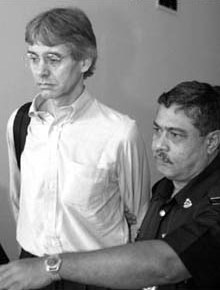
Murray Hiebert spent 30 days in jail for reporting that the son of a prominent Malaysian judge had been kicked off the high school debate team. In this essay, Hiebert recounts his ordeal.
Washington, DC — I’ve become quite an expert on Malaysian tourist spots over the past two years. That’s because a local judge sentenced me to three months in prison for “scandalizing the court” in a magazine article that I wrote in 1997. While my appeal wound its way through the Malaysian legal maze, I was forced to remain within the borders of peninsular Malaysia. My problems began in early 1997 when I wrote an article in the Far Eastern Economic Review, a news weekly published in Hong Kong by Dow Jones & Co, about a mother who was suing the International School of Kuala Lumpur for $2.4 million. She mounted the suit because fellow students had kicked her 17-year-old son off a debating team for alleged cheating. I used this case as an example to demonstrate that Malaysia had become almost as litigious as the United States.
I paid a heavy price for that piece: on October 11, 1999, I finally got my passport back after completing 27 months under “country arrest” and 30 days in prison.
In many Commonwealth countries, including Malaysia, private citizens can bring contempt of court charges against other individuals. In my case, the plaintiff was the wife of an Appeal Court judge. She filed her case with a High Court judge who found me guilty of contempt of court and sentenced me to three months in prison. I appealed the verdict, but had to wait two years for a hearing, during which time the courts held my passport as a condition of bail. In the end, the Appeal Court upheld my conviction, but reduced the sentence to six weeks. Prison officials cut my term by one third for good behavior.
Although my case was unique, it has implications for other journalists working in Malaysia. The sentencing judge stated quite clearly that he was making an example of me because of his frustration with previous criticisms of the Malaysian legal system. “In my view, for far too long there appears to be unabated contemptuous attacks by and through publications or the media on the judiciary,” the judge said. “It is high time that our judiciary shows its abhorrence to such contemptuous conduct . . .”
I’m not the only journalist in Malaysia who has faced legal intimidation because of his work. A colleague from The Asian Wall Street Journal, which like the Review is owned by Dow Jones, is being sued for millions of dollars for alleged comments he is said to have made about the Malaysian judiciary in an interview with International Commercial Litigation, a magazine published in London. In two other suits, The Asian Wall Street Journal is being sued by businessmen close to the Prime Minister Mahathir Mohamad. One of them is the prime minister’s son, Mirzan Mahathir. The damages sought total several hundred million dollars.
And the threats don’t end there. A local journalist with The Star, a local newspaper owned by a Chinese political party in Malaysia’s ruling coalition, was threatened with a contempt of court suit when she wrote about one of the law suits facing Dow Jones. The message for journalists is hard to miss: you risk bankruptcy and prison if you write about political and economic developments in Malaysia. Is it any wonder that Malaysian editors and journalists increasingly censor themselves to avoid lawsuits?
Fortunately, Malaysian prisons aren’t nearly as violent as US prisons, or as overcrowded and run down as jails in many developing countries. The most shocking thing for me was the abrupt loss of freedom.
You have to struggle to keep up hope when the prison door clinks shut behind you. And it isn’t easy to learn to sit on the floor stripped to the waist half a dozen times a day while waiting to be counted by cocky guards, or to get used to using the doorless toilet when you get sick. But it would have been much harder for me endure the ordeal if the other inmates hadn’t adopted me into the prison family.
On top of that, I was lucky that my jail term was relatively short. Still it was long enough for me to reflect on the value of press freedom and freedom of speech. I also gained new appreciation for those who have struggled to protect these freedoms. A few days after I was jailed I was taken to meet the prison director who let me watch while he looked through my file. It contained copies of protest statements by CPJ, Amnesty International, President Clinton and others. The fact that the world was watching helped guarantee that I had a relatively easy stay.
When I walked out of prison on October 11, my heart ached for the roughly 100 journalists around the world who couldn’t enjoy my new-found freedom. I also knew I would never again take the work of groups like CPJ for granted.
This article was published by The Committee to Protect Journalists (CPJ), an independent, nonprofit organization founded in 1981. The CPJ promotes press freedom worldwide by defending the rights of journalists to report the news without fear of reprisal. Murray Hiebert, a 3rd generation Berliner Kehler, is the son of (the late) Rosemarie (nee Wieler) and Abram Hiebert.
